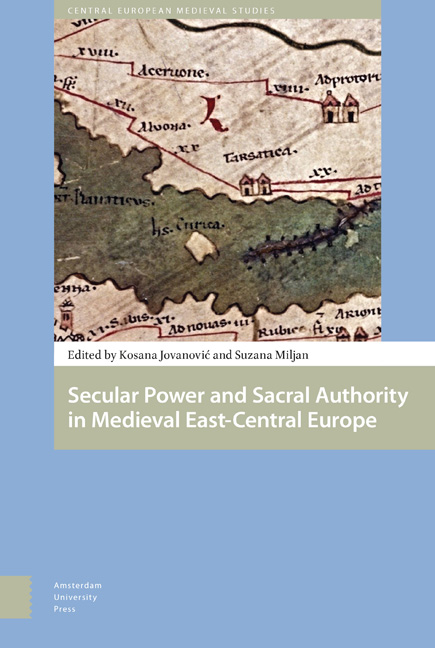Book contents
- Frontmatter
- Contents
- List of Figures and Tables
- Acknowledgements
- Foreword
- Folklore of the Medieval Kings of Hungary: Preliminary Research Report
- Variations on Nobility in Central and South-Eastern Europe: An Introduction
- The Changes of Office of Ban of Slavonia after the Mongol Invasion in Hungary (1242-1267)
- The Reconstruction and Role of Roads in the Formation of a Medieval Cultural Landscape: The Example of Episcopal Estates of Dubrava, Ivanić and Čazma
- From Castle-Warrior to Nobleman: Case Study of a Family of Slavonian Lesser Nobility
- Late Medieval Village in Turopolje (Slavonia): The Example of Donja Lomnica
- Economic Development and Transformation of the Pauline Monasteries near Senj under the Frankapan Patronage
- The Society of the Noble Judges in Northeastern Hungary during the Reign of King Sigismund (1387-1437)
- Development of Ragusan Diplomatic Service in the First Half of the Fifteenth Century: Father and Son at the Court of Duke Sandalj Hranić
- Croatian Students at the University of Prague in the Fifteenth Century
- A Contribution to Medieval Croatian Diplomatics: Cyrillic Charters of Croatian Nobility from the Franciscan Monastery on Trsat in Rijeka
- Peter of Crkvica, a Man Who Could Be Trusted: The Career of a Middle-Ranking Cleric and Diplomat in the Kingdom of Hungary in Mid-Fifteenth Century
- The Nobility of the Despotate of Serbia between Ottoman Empire and Hungary (1457-1459)
- List of Contributors
- Index
Variations on Nobility in Central and South-Eastern Europe: An Introduction
Published online by Cambridge University Press: 12 December 2020
- Frontmatter
- Contents
- List of Figures and Tables
- Acknowledgements
- Foreword
- Folklore of the Medieval Kings of Hungary: Preliminary Research Report
- Variations on Nobility in Central and South-Eastern Europe: An Introduction
- The Changes of Office of Ban of Slavonia after the Mongol Invasion in Hungary (1242-1267)
- The Reconstruction and Role of Roads in the Formation of a Medieval Cultural Landscape: The Example of Episcopal Estates of Dubrava, Ivanić and Čazma
- From Castle-Warrior to Nobleman: Case Study of a Family of Slavonian Lesser Nobility
- Late Medieval Village in Turopolje (Slavonia): The Example of Donja Lomnica
- Economic Development and Transformation of the Pauline Monasteries near Senj under the Frankapan Patronage
- The Society of the Noble Judges in Northeastern Hungary during the Reign of King Sigismund (1387-1437)
- Development of Ragusan Diplomatic Service in the First Half of the Fifteenth Century: Father and Son at the Court of Duke Sandalj Hranić
- Croatian Students at the University of Prague in the Fifteenth Century
- A Contribution to Medieval Croatian Diplomatics: Cyrillic Charters of Croatian Nobility from the Franciscan Monastery on Trsat in Rijeka
- Peter of Crkvica, a Man Who Could Be Trusted: The Career of a Middle-Ranking Cleric and Diplomat in the Kingdom of Hungary in Mid-Fifteenth Century
- The Nobility of the Despotate of Serbia between Ottoman Empire and Hungary (1457-1459)
- List of Contributors
- Index
Summary
The research on nobility investigates certain lifestyles, strategies, and activities of social elites in Croatia, Bosnia, Serbia, and Hungary from the mid-thirteenth to the late fifteenth century. This time frame covers a period from the formation of the landed nobility as a distinct social group in these territories to the emergence of an even more distinguished group among them, the aristocracy (barones). Although thematic sessions of a conference from where these articles derived can hardly lay claim for completeness, this group of papers offers a remarkable cross-section of the many facets of this complex social category. The contributions by eleven young historians and archaeologists tackle – through well researched examples based on the analysis of written and non-textual primary sources – all those issues that were essential for the social distinction that the nobility embodied: ownership of land on some scale, performing military duties, holding offices in the governance and jurisdiction of a certain area, gaining access to diplomatic circles, which were, by the beginning of the fifteenth century, being dominated by highly-educated individuals, as well as being patrons of churches and monasteries. All this, of course, in addition to the descent from particular lineages or kinships. In the following we shall highlight some important points from the five articles along these lines.
The ownership of land was an indispensable – and in the most literal sense of the word fundamental – prerequisite of the eminence of the nobility. In case of the bans of Slavonia and Dalmatia-Croatia tackled by Judit Gál's article, it was taken for granted that only members of families with substantial landed properties qualified for these offices, and all three officeholders in the mid-thirteenth century – Denis Türje, Stephen Gutkeled, and Roland Rátót – stemmed from kindreds with huge ancestral estates and undisputed pedigree. On the contrary, rights and claims for nobility had to be acquired through merits and virtue by members of a specific group, the castle warriors (iobagiones castri) of Slavonia, the protagonists in Éva B. Halász's study. Families of this legal standing were ‘survivors’ of an earlier system based on the military service performed in connection with specific strongholds, from which their right to landownership derived.
- Type
- Chapter
- Information
- Publisher: Amsterdam University PressPrint publication year: 2018



